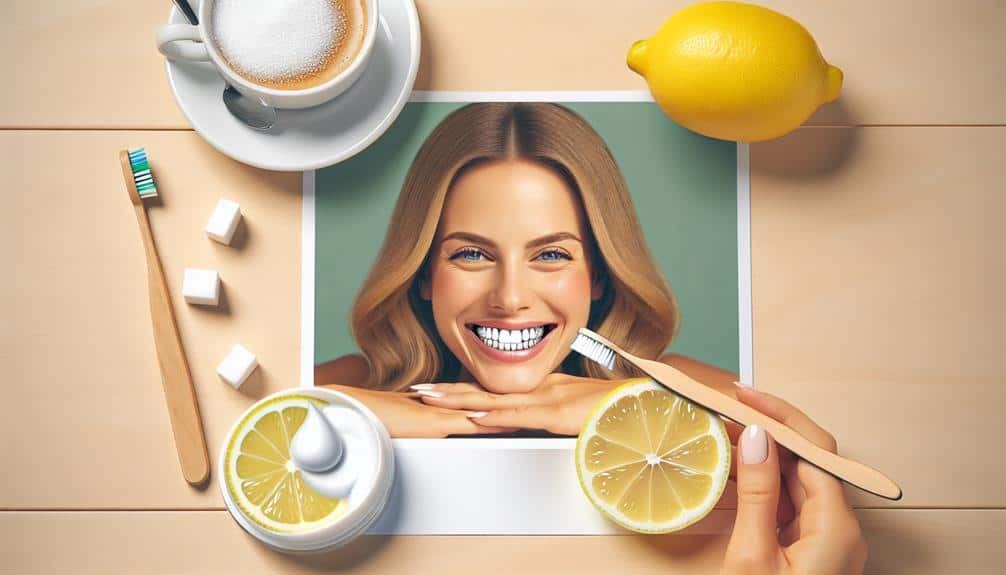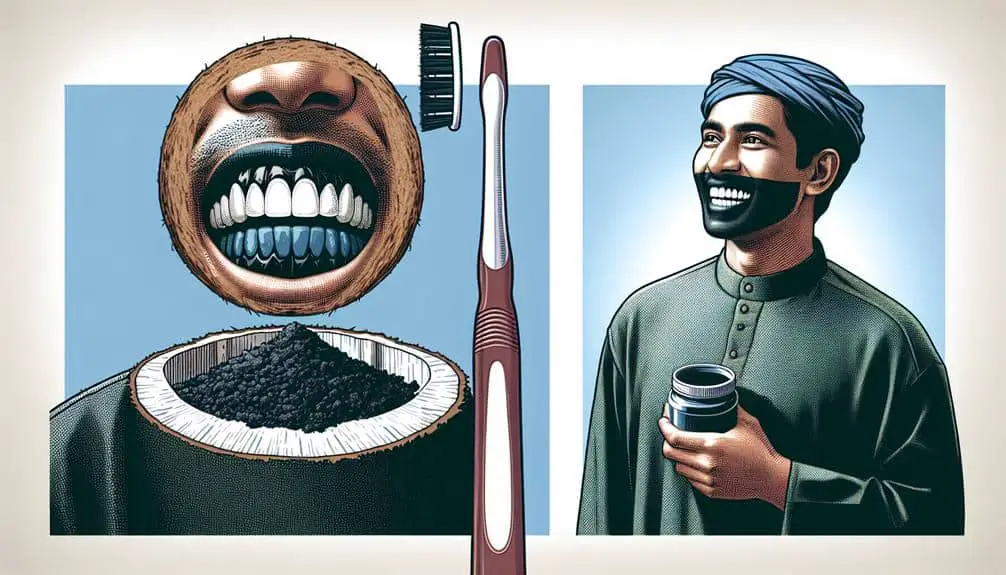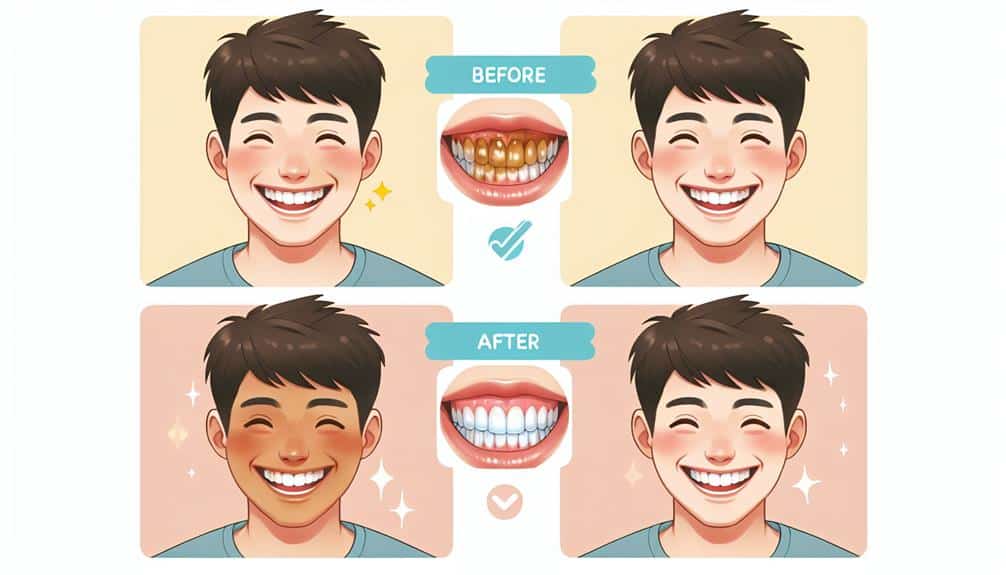To prevent coffee stains effectively, adjust your habits. Limit intake and choose lighter roasts. Use a straw to minimize contact with teeth. Rinse your mouth after drinking, swishing mouthwash to combat stains. Promptly brush your teeth to remove residue, promoting enamel protection. Schedule regular dental cleanings to remove plaque and tartar. Floss daily and opt for fluoride treatments. These strategies will help maintain a bright smile.
Key Points
- Limit coffee intake to reduce staining risk.
- Use a straw to minimize direct contact with teeth.
- Rinse mouth with mouthwash or water after drinking.
- Brush teeth immediately after consuming coffee.
- Schedule regular dental cleanings to prevent stains.
Limit Coffee Consumption
To reduce the likelihood of coffee stains, consider cutting back on your daily coffee intake. While coffee is a beloved beverage, excessive consumption can lead to an increased risk of staining your teeth. Instead of reaching for multiple cups throughout the day, try to drink water between each coffee serving. Water can help rinse away some of the pigments that cause staining and reduce the overall contact time coffee has with your teeth.
Additionally, opt for lighter roasts over dark roasts. Dark roasts tend to be more acidic and have higher levels of chromogens, compounds that can discolor your teeth. Lighter roasts aren't only gentler on your enamel but also contain fewer staining agents. By making these simple adjustments to your coffee habits, you can enjoy your favorite brew while minimizing the potential for unsightly coffee stains on your teeth.
Use a Straw
Consider using a straw when drinking coffee to help prevent stains on your teeth. Straws can minimize direct contact between the coffee and your teeth, reducing the likelihood of staining. While plastic straws are common, you may want to explore eco-friendly alternatives like reusable straws made from materials such as stainless steel, silicone, or bamboo. These options aren't only sustainable but also durable and easy to clean.
When choosing a straw, opt for one that's the appropriate size for your beverage to guarantee a smooth drinking experience. Reusable straws are ideal for those looking to decrease waste and contribute to environmental conservation efforts. They come in various colors and designs, allowing you to express your style while enjoying your coffee stain-free.
Rinse Mouth After Drinking
After using a straw to drink your coffee, it's beneficial to rinse your mouth thoroughly to help prevent potential staining on your teeth. A mouthwash rinse is an effective way to remove any lingering coffee residue from your mouth. Choose a mouthwash that contains ingredients like hydrogen peroxide or fluoride to help combat stains and strengthen tooth enamel. Swish the mouthwash around in your mouth for about 30 seconds before spitting it out.
Additionally, applying lip balm before drinking coffee can create a barrier between your lips and the coffee, reducing the direct contact coffee has with your teeth. This can help minimize the risk of coffee stains on your teeth and lips. Opt for a lip balm that contains SPF to protect your lips from sun damage, as well.
Brush Teeth Promptly
Upon finishing your coffee, promptly brush your teeth to remove any potential staining residue. Brushing your teeth after consuming coffee is vital in preventing coffee stains. Coffee contains components that can adhere to your teeth, leading to discoloration over time. By brushing immediately after your coffee, you can effectively remove these staining particles before they've a chance to settle and cause harm.
In addition to brushing, consider incorporating mouthwash into your oral hygiene routine. Mouthwash benefits include reaching areas in your mouth that a toothbrush may not access, helping to further remove any remaining coffee residue. Opt for a mouthwash that promotes enamel protection to safeguard your teeth from erosion and sensitivity. Enamel protection is essential in preventing stains from penetrating the surface of your teeth, maintaining their natural whiteness.
Regular Dental Cleanings
Routine dental cleanings are vital for maintaining optimal oral health and preventing coffee stains. During these cleanings, your dentist or dental hygienist will thoroughly remove plaque and tartar buildup that regular brushing may miss. This is essential as plaque can trap stains from coffee, leading to discoloration of your teeth over time. Additionally, regular dental cleanings allow for the detection of any early signs of staining or other dental issues, enabling prompt intervention.
Flossing daily is another important practice that complements regular dental cleanings. By flossing, you can remove plaque and food particles from between your teeth, reducing the chances of stains developing in those areas. Moreover, incorporating fluoride treatments into your dental care routine can help strengthen your teeth and make them more resistant to staining agents like coffee.
Frequently Asked Questions
Can Certain Types of Coffee Cause More Stains Than Others?
Certain types of coffee with high acidity can exacerbate staining. Varying brewing methods also impact the potential for stains. Be mindful of these factors when selecting your brew to minimize the risk of unsightly coffee stains.
Are There Specific Toothpaste or Mouthwash Products That Can Help Prevent Coffee Stains?
To prevent coffee stains, consider coffee alternatives like herbal teas. Look for stain-resistant dental products like toothpaste and mouthwash with whitening properties. These products can help maintain your smile's brightness while enjoying your favorite beverages.
Is It True That Drinking Water Alongside Coffee Can Help Prevent Stains?
When you drink water alongside coffee, you boost hydration levels, aiding saliva production. This helps counteract staining effects by washing away coffee residues and maintaining oral health. Incorporating this habit can benefit your teeth.
How Long Should I Wait to Brush My Teeth After Drinking Coffee to Prevent Staining?
After drinking coffee, wait at least 30 minutes before brushing your teeth. This time lapse allows your enamel to recover from the acidic effects of coffee, reducing the risk of damage and staining, promoting peak oral health.
Can Using a Whitening Toothpaste Help Remove Coffee Stains?
You might think whitening toothpaste is a miracle worker against coffee stains, but it's no magic wand. Despite its claims, it may not fully remove stubborn discoloration. Consider professional dental cleanings or whitening treatments for better results.



